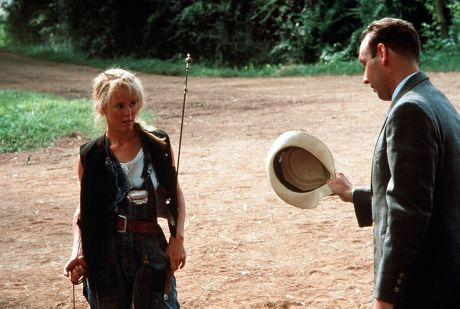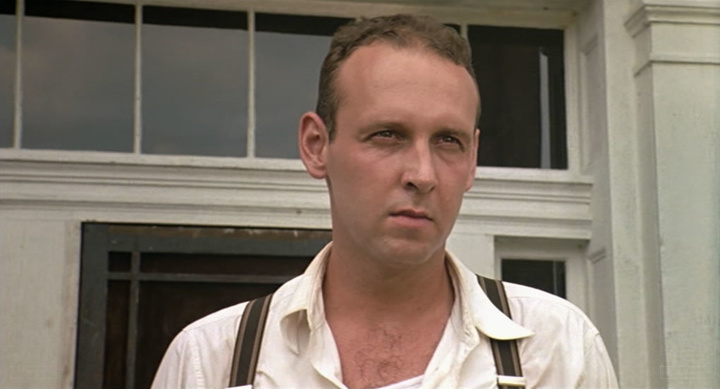
Frank Bennett is not just the villain of Fried Green Tomatoes. He is the embodiment of oppressive masculinity, a man who weaponizes every tool society gives him — patriarchy, law, and fear — to dominate others. He is not complex in the way that makes us sympathize with him, but he is complex in what he represents: a legacy of control, fear, and emotional disfigurement that reaches far beyond one marriage.
In this deep dive, we’ll uncover not just what Frank does, but who he is beneath the cruelty — and why he remains terrifyingly relevant even today.
Psychological Profile: Control as a Personality
Frank doesn’t love Ruth. He doesn’t even appear to like her. What he wants is ownership — of her body, her loyalty, her obedience. His brand of masculinity is rooted in dominion. He thrives in an ecosystem where:
-
Marriage is a contract of subjugation
-
Fathers own children more than mothers
-
Violence is a right, not a last resort
Frank doesn’t need to yell all the time. He controls with looks. With consequences. With the unspoken power of being a white Southern man who knows the law — and bends it to crush others.
He is not a madman. He is the perfectly rational product of a broken system.
The House as a Prison
Ruth’s home with Frank is not a domestic space — it is a cage. The film makes this clear through:
-
The dim lighting and heavy shadows in scenes set at their home
-
Ruth’s shrinking body language
-
The feeling that no one is watching — and no one would intervene if they did
Frank’s power is rooted not only in what he does, but in what he knows no one will stop him from doing. That’s what makes him frightening: he doesn’t fear consequences. His power feels eternal — until it isn’t.

The Baby as a Battleground
When Ruth tries to leave, Frank doesn’t plead or beg. He threatens to take her child. Not because he loves the baby — he likely doesn’t — but because he knows what that child means to Ruth. In doing so, he makes the child a weapon, and in extension, turns parenthood into a power struggle.
This moment is when Ruth realizes: Frank will not stop. He will escalate. And it is also when Idgie realizes that justice will not save them.
Frank’s Disappearance: Justice or Vengeance?
Frank goes missing. The film never shows what exactly happens to him, but the unspoken implication is that Idgie and the gang at the Whistle Stop Café kill him — or help cover up whoever did.
And yet, it doesn’t feel like a murder mystery. It feels like an exorcism.
Frank’s disappearance is:
-
The release of Ruth from bondage
-
The preservation of her child
-
The closing of a chapter in which cruelty ruled unchallenged
There’s a reason no one in town asks too many questions. Everyone knows Frank. And everyone knows.
Frank’s Function in the Narrative
Frank isn’t written to be understood. He’s written to be recognized — by every woman who has met a man who:
-
Believes his opinion is law
-
Believes silence is consent
-
Believes fear is a tool, not a crime
He’s also written as the dark mirror of every male character in the film:
| Character | Contrast With Frank |
|---|---|
| Buddy Sr. | Kindness, playfulness, affection |
| Grady Kilgore | Loyalty, emotional restraint |
| Stump (Buddy Jr.) | Innocence, unformed masculinity |
| Ed Couch | Passive neglect, not active harm |
Frank is the most active danger. He’s not indifferent — he’s destructive with intent.
Frank and the Law: The Myth of Protection
One of the film’s most haunting truths is this: the law never protects Ruth. She’s married, and that means the law favors Frank.
When she runs, she is the criminal.
When he threatens, it’s “domestic business.”
When she fights back, it becomes murder.
Frank’s character forces the viewer to confront a disturbing historical fact: for much of modern history, abuse wasn’t hidden — it was permitted. In that world, the only justice possible was the justice one took for oneself.
Why We Still Need to Talk About Frank
Frank Bennett isn’t just a character from a 1991 film set in the 1930s. He’s a chilling echo of:
-
Partners who use children to trap women
-
Systems that look away from intimate violence
-
Cultures that teach boys that control is the definition of love
To understand Frank is to understand why Ruth needed to escape, why Idgie had to fight, and why Fried Green Tomatoes still resonates in today’s conversations around toxic masculinity and gender-based power dynamics.
Frank as the Monster We Know
What makes Frank horrifying is that he’s not a monster in the shadows. He’s a husband. A father. A neighbor. Someone the town might have waved to at the market.
He’s not a myth.
He’s a memory.
And that’s why he must be remembered — not as a villain in fiction, but as a warning in reality.
